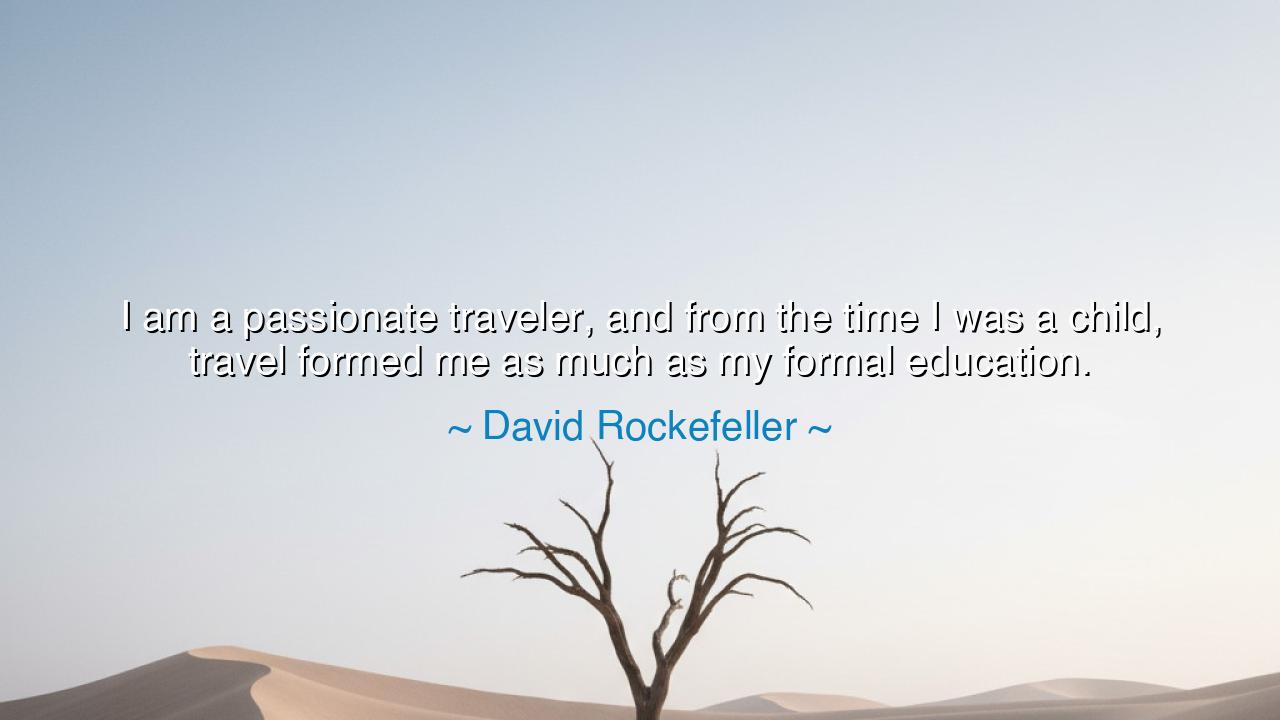
I am a passionate traveler, and from the time I was a child
I am a passionate traveler, and from the time I was a child, travel formed me as much as my formal education.






David Rockefeller, heir to one of America’s most powerful families, once confessed a truth that reaches beyond wealth and privilege: “I am a passionate traveler, and from the time I was a child, travel formed me as much as my formal education.” His words carry the weight of experience and the humility of recognition, for he admits that books and classrooms, though invaluable, were not the only teachers of his life. The road, the journey, the face of the stranger, and the lands beyond his own—these were also his tutors.
The first wisdom here is the transformative power of travel. Formal education shapes the mind through reason, discipline, and study. But travel shapes the soul, awakening curiosity, empathy, and resilience. For Rockefeller, wandering beyond the safe boundaries of home gave him lessons no professor could provide. To stand in a marketplace of Morocco, to walk the streets of Paris, or to see the mountains of South America—each moment became a living classroom. He was formed not only by theory, but by life itself.
The second truth is that travel begins in childhood. Rockefeller recalls how early experiences opened his spirit to the vastness of the world. Here lies an ancient lesson: the younger one begins to encounter diversity, the more deeply it shapes their vision. Just as Alexander the Great was tutored not only by Aristotle but by the lands he marched through, so too was Rockefeller instructed by his own encounters with cultures and peoples. Childhood travel taught him that the world is larger than one’s nation, and that wisdom grows through exposure to difference.
History abounds with parallels. Consider Marco Polo, whose youthful journey to the East made him the chronicler of wonders that forever changed Europe’s imagination. Or Herodotus, the “Father of History,” who wandered across empires and kingdoms, weaving stories of peoples far beyond Greece. Their education was not confined to scrolls—it was lived upon roads, rivers, and seas. Rockefeller’s reflection is born of this same lineage: true knowledge comes not only from study, but from stepping into the unknown.
There is also humility in his confession. A man of privilege might have claimed that universities and tutors alone gave him his wisdom. Yet Rockefeller admits that travel, with all its unpredictability and discomforts, shaped him equally. This humility is wisdom itself: to recognize that every encounter, from the poorest villager to the grandest palace, is a teacher. To travel well is not to collect souvenirs, but to let the world instruct you.
The emotional power of his words is that they remind us of the double nature of education. One side is formal, structured, given by institutions. The other is wild, organic, given by the open road. Without one, we lack discipline; without the other, we lack perspective. Rockefeller’s life was shaped by both, and in this union he found wholeness. His words are a call to us: do not let your knowledge remain confined to books, nor your travels remain shallow and unreflective. Let each serve the other.
The lesson, then, is clear: if you seek wisdom, seek both the classroom and the road. Learn from teachers, but also from strangers. Study the histories of nations, but also walk their streets and taste their bread. Let travel teach you humility, patience, and openness, while education sharpens your reason and judgment. Together, they form the complete person.
Practical counsel follows: if you have the chance, begin travel early, and do so not as a tourist but as a learner. Carry notebooks, ask questions, sit with locals, and see each encounter as a form of schooling. And if you cannot journey far, then travel through books, through conversation, through curiosity that refuses to be fenced in. For as Rockefeller teaches, the world itself is a great teacher—and if you open yourself to it, it will form you as surely as any classroom ever could.






AAdministratorAdministrator
Welcome, honored guests. Please leave a comment, we will respond soon